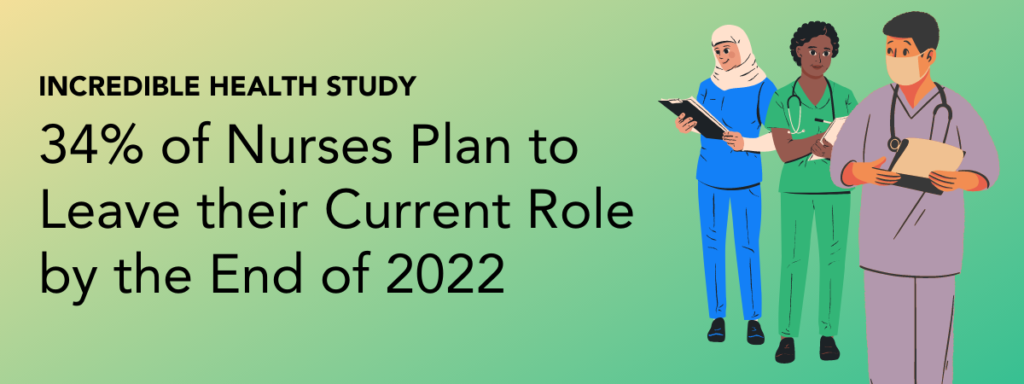
Nurses and the challenges they face continue to be at the forefront of the national conversation. And for good reason: they are the backbone of our health system and critical in fighting COVID-19. We asked our population of nurses about the state of nursing to better understand and serve them.
We analyzed our own proprietary hiring data of over 400,000 nurses and surveyed nurses who utilize the Incredible Health platform nationwide. Our third annual Nursing In The Time Of COVID-19 report highlights:
- How nurses are faring as we enter the third year of the pandemic.
- Nursing trends.
- Areas of friction where both health systems and the community can step in to help ease their frustrations.
The majority of nurses are now protected against COVID-19
89% of nurses surveyed have received one or more doses of the COVID-19 vaccine, compared to 73% last year. This is good news on the vaccine front, as at this time last year, 33% of nurses who had not been vaccinated reported that they didn’t plan to take the vaccine at all.
Over half (54%) reported never contracting the virus while at work.
One way health systems can support their nurses is by allowing them to take time to rest and recover if they are infected with COVID-19. Nearly a fourth (23%) of nurses reported that they had been asked to work while being positive for COVID. Another 38% have had to use vacation days and/or sick days to stay home.
Sign-on bonuses replace pay increases
Instead of offering higher salaries, health systems are attracting nurses with sign-on bonuses. Proprietary salary data showed small changes to hourly rates nationally, but a 162% increase in total offers with signing bonuses. Florida had the highest average sign-on bonus at $13,095.
California continues to have the highest average salary on Incredible Health, which sits about 20% higher than the national average of $80,010.
[Nurses: Get a personalized salary estimate for your location and nursing specialty]
In Texas, sign-on bonuses in the state nearly doubled from an average of $5,800 to $10,700 in the past year. In 2021, nearly three out of five (58%) offers in Texas had bonuses compared to less than one in five (16%) the year before.
Nurses will relocate – for the right role
Location has become less of a reason for nurses to reject a job interview, dropping 28% from the previous year. What does this mean? Nurses are more open to relocating to find roles that better fit their needs and preferences.
[Read: How to Get a Nursing License in Another State]
Travel nurses remain a flashpoint issue
77% of nurses surveyed reported seeing an increase in travel nurses in their unit during the past year. A third of nurses in permanent roles (32%) said that this increase made them feel dissatisfied or extremely dissatisfied. Compensation is the heart of the issue.
The majority (86%) reported that compensation differences were the leading cause of their dissatisfaction with travel nurses, who are often highly paid by temporary staffing agencies to solve critical gaps. Additionally, nearly half (47%) believed the quality of patient care suffers from this kind of temporary staffing.
A third of nurses (33%) also noted that unit culture changes with an influx of travel nurses.
[Read: 5 Things to Consider Before Becoming a Travel Nurse]
Burnout and pay continue to fuel high turnover
Over a third (34%) of the nurses surveyed reported that it is very likely that they will quit their job by the end of 2022. 44% cited burnout and a high-stress environment as the reason for their desire to leave. Benefits and pay are the second leading cause (27%).
That being said, not all nurses who plan to quit their jobs plan to leave the nursing field. 40% plan to pursue a nursing role elsewhere.
[Read: Nurse’s Resource Guide To Coping with Burnout, Stress, and Mental Health Challenges]
Nearly a third (32%) of nurses plan to leave the field altogether or retire.
42% of nurses surveyed have started a new nursing role since January 2021. The main reason they moved to a new role was higher pay (58% reported this was their motivating factor).
Other reasons for the change include a search for a different role (33%), an improved schedule (31%), their preferred location (25%), career advancement or training opportunities (24%) and better staffing overall (24%).
[Read: 12 leadership habits to improve nurse retention, according to research]
Nurses are fighting discrimination and assault on the front lines
Perhaps most disconcerting, 65% of the nurses surveyed reported that they had been verbally or physically assaulted by a patient or a patient’s family member within the last year. Anger around hospital/COVID guidelines (52%) and frustration around staffing/care (47%) were the contributing factors to this aggression.
A third (32%) said they had experienced discrimination and/or racism in the workplace. While most of this discrimination and/or racism was from patients and their families (46%), co-workers and supervisors were also reported as a source.
[Read: Workplace Violence in Healthcare]
How community members and health systems can help
Two-thirds (66%) of nurses reported that they do not feel adequately appreciated by their local community for their role in battling COVID. While this is an improvement from last year’s survey, when 73% of nurses reported feeling this way, there is still much to improve.
The easiest way for community members to support nurses is by following local and CDC COVID-19 guidelines, and treating nurses you come into contact with patience and respect.
Health systems can support their workforce in a number of ways:
- Provide clear career advancement opportunities, skill growth and training.
- Offer more flexible scheduling options.
- Properly staff teams.
- Offer competitive pay.
- Encourage better teamwork and transparency.
- Offer stronger management training, including building a more supportive work culture.
Managers can help as well:
- Provide more clarity on career mobility and training opportunities.
- Include nurses in decision making and governance.
- Show more appreciation to nurses.
- Ensure staff are taking breaks.
- Communicate about future plans and vision.
- Do more wellness checks.
If your hospital is looking for a better way to hire nurses, click here.
Incredible Health’s award-winning marketplace technology helps your talent acquisition team hire permanent, experienced nurses in 20 days or less, save at least $2 million per year per facility, and improve nurse retention.
You can download the visual report here.
Methodology
We analyzed data from more than 400,000 Incredible Health nurse profiles. We also surveyed more than 2,500 registered nurses in the United States in February 2022.
Get job matches in your area + answers to all your nursing career questions

